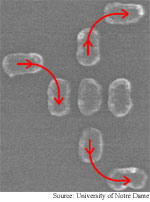|
NEWS
|

|
 |
Magnetic
logic advances
Magnetic memory chips, which retain data after
the power is turned off, are becoming available and could
eventually supplement or even replace disk drives in computers.
Several research teams are looking to take this technology
beyond simply storing data by using it in computer chips
that process data...
|
Seeing
the light of Net access
High-speed Internet access and wireless home networks
are widespread technologies, and researchers are working
to make them faster and cheaper...
|
Carbon
gets more hydrogen
Hydrogen is a clean-burning fuel, but using it
as an environmentally friendly energy source requires
finding clean ways to produce it. One of the most promising
approaches is solar water-splitting, a scheme to use sunlight
to drive the chemical separation of hydrogen and oxygen
from water...
|
Chemistry
pumps artificial muscle
Much of the research into artificial muscle involves
using electricity or temperature to change the shape of
polymer materials. A major aim of this research is to
use these materials to someday power machines like robots...
|
Bits
and pieces
A bacterial product slows light, dead bacterial
bodies pump fluids, and nanoscale light promises to speed
supercomputers. |
FEATURES
|
View
from the High Ground: Cornell's Jon Kleinberg
Six degrees of separation, buying gasoline
by the molecule, the science of popularity, all just getting
along online, intellectual prosthetics, Big Science, making
up questions, and telling stories.
|
How
It Works: Quantum computing: qubits
Photons, electrons and atoms, oh my! These particles are
the raw materials for qubits, the basic building blocks
of quantum computers. |
|
 |
News RSS feed 
Blog RSS feed 
Bookshelf RSS feed

New: TRN's
Internet Services
TRN's Jobs Center
|
| |
SMALLEY'S
RESEARCH WATCH |
| January
20, 2006 |
Pigs
in space
Although the latest news on
tipping points is about global warming, it
looks like we have another pollution-related
tipping point to contend with -- artificial
debris in Earth orbit.
A study by NASA scientists shows that
if no spacecraft were launched after December
2004, collisions among satellites, rocket
parts and fragments thereof -- numbering more
than 9,000 -- will produce more fragments,
adding objects in low Earth orbit...
January
20, 2006
Warming
threatens sea life
January
13, 2006
Tiny
teachers
January 6, 2006
Dangerous
thoughts ahead |
|
|
| |
"In
most areas of science and technology, the origins
of new breakthroughs can still be found in the work
of a small number of people -- or even a single
person -- working at their own pace on their own
questions, pursuing things that interest them. "
- Jon Kleinberg, Cornell University |
|
| |
|
| |
Thanks
to Kevin from
GoldBamboo.com
for technical support |
|

